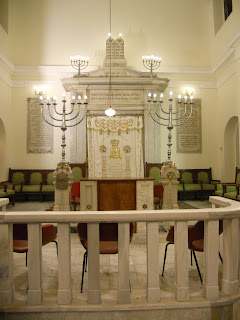We finally arrived in Thessaloniki, Greece on Thursday
night. This isn’t just any plain old Greek city though; it was one of the top 5
party cities in the world 2 years ago and we stayed here for 3 nights, our
longest stay in one place in Greece. Thursday night we were each given ten euro
for dinner and we had the chance to eat whatever authentic Greek food our
mouths and bellies desired. I had my first taste of delicious Greek cheese
after checking out at least 6 or 7 other restaurants.
We had a light schedule on Friday, but that doesn’t mean we
got any extra sleep. We left the hotel at 8:30 for the only remaining pre-WWII
synagogue in Thessaloniki.
Thessaloniki’s history is rich with Jewish influence.
Salonika, the ancient name of Thessaloniki, was a hot spot for the Spanish Jews
after the expulsion, as 15,000-20,000 Jews immigrated to the natural port city
in northeast Greece. The city even closed its port on Shabbat, and the entire
city was a huge party on Simchat Torah which included dancing by the port. The
Holocaust took a toll on the flourishing city as 95% of the 55,000 Jews in
Salonika perished in concentration camps. The shul we visited was actually
where Rabbi Coretz made an announcement that decided the fate of many Salonikan
Jews. He stood on the very same bima that Rabbi Dov was standing on and told
everyone that they would be safe and successful in Poland and Germany.
Then we visited the square, which is now a parking lot,
where the “Black Sabbath” occurred. All the Jewish men between the ages of
18-45 were forced out into the sweltering heat and were humiliated. A monument
was only put up for those men in 1997.
Only about 2,500 people came back, and about 10 returned
with numbers on their arms. Today there are only about 1,000 Jews in
Thessaloniki.
We also went to the Jewish Museum of Thessaloniki, where we
pretty much reviewed everything we learned in Jerusalem, and some. I asked why
the 15,000-20,000 Jews decided to come to Salonika? How did they know it was a
safe place to come to after the Expulsion? I was told that the sultan wanted people to reinvigorate the poor, struggling city. He saw them as people
who could improve the city and pay taxes, not as an inferior religion or
nation, which I think was refreshing for the Jews at the time.
Friday night and Shabbat morning we went to shul at the
other synagogue in Thessaloniki, which was also Saphardic. (If I didn’t mention
it before, virtually the entire Balkan region is Sephardic because most of them
came from Spain and Portugal.) It was my first time really listening to and
experiencing a Sephardic service, and honestly it was slightly uncomfortable,
but an overall good experience.
The rest of my Shabbat and Saturday night was extremely
relaxing and enjoyable. I had some more traditional Greek food, and I was lucky
enough to enjoy the sunset over the harbor.
Today (Sunday) we learned about the history of the city, aside from
the Jewish part. We saw beautiful views of Thessaloniki from the edge of the
city, and we could see the division between the old and new sections of the
city (the red roofs are old, and the rest is new).
A large portion of the city was devastated in the Great Fire
of 1917, which left many people homeless, and it was a big hit to a newly
thriving city.
After our tour we took about a 3-hour bus ride to Vergina,
where Philip II, father of Alexander the Great, is buried in his elaborate and
incredibly well preserved tomb.
Philip II was born around 382 BCE, and became the king of
Macedonia in 359 BCE. His nation was a weak, poor, and divided state, which was
threatened on all sides. By 336 BCE the king was at the height of his power,
and he turned Macedonia into the leading power of his day, changing the course
of history. The design on the box that holds his ashes was the same as the
design on the old Macedonian flag. Although we were not allowed to take
pictures, I was still able to sneak a picture of the gold box that contains the
king.
Unfortunately for him
he was assassinated the same year, when he was only 46. However his nation of
Macedonia had nothing to fear, as he paved the way for his son Alexander’s
previously unprecedented campaign.
We drove to Iaonnina (pronounced Ya-ni-nah) around 3 and
arrived in time for dinner where I ate at a very homey and delicious Greek
restaurant. Tonight we are beginning our stretch of days where we will stay in
a different city or town each night. It will be pretty chaotic, but I’m looking
forward to the adventure.
And just to update everyone on what the current plan is for
after our trip, we have two options. If Kivunim determines that it is safe to
go back to Israel, we will, but if they decide otherwise, the plan is to go to
New York and potentially spend the next month there continuing our studies as
normally as possible and doing social responsibility projects.
We are all thinking about and praying for those affected in
Israel and Gaza, and we hope the fighting will stop as soon as possible.
“Plans change.”- DL






No comments:
Post a Comment